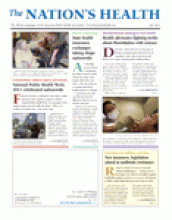Programs to control tuberculosis have led to declines in the number of cases worldwide, but despite the progress, drug-resistant strains of TB continue to vex health workers and researchers, according to a World Health Organization report released in March.
Since 2009, the 23 countries most heavily affected by TB drug resistance have nearly doubled their budgets for multidrug-resistant TB — a form of TB that fails to respond to standard first-line drugs. While community-based models of care and other programs have helped save the lives of more than 4 million people and provided treatment to 7.7 million people, “severe bottlenecks” are limiting the response to the drug-resistance epidemic, according to the report.
“Many countries have made progress, but despite the recent scale up in efforts, the world needs to do much more to get care to all MDR-TB patients who need it,” said WHO Director-general Margaret Chan, MD, MPH, in March. “We cannot allow MDR-TB to spread unchecked.”
The report, “Towards Universal Access to Diagnosis and Treatment of MDR-TB and XDR-TB by 2015,” calls for scaling up both domestic and international funding and accelerating access to treatment for multidrug-resistant TB, or MDR-TB, and extremely drug resistant TB, or XDR-TB. According to the report, diagnostic capacity remains limited, the price of some quality-assured second-line drugs remains high and drug shortages continue to pose problems.
Leaving MDR-TB untreated increases the risk of the spread of drug-resistant strains of TB, according to WHO, which estimates there will be more than 2 million new cases of MDR-TB between 2011 and 2015.
Closer to home, tuberculosis is at an all-time low in the United States, but minority and foreign-born residents continue to be affected disproportionately, according to a study from the Centers for Disease Control and Prevention.
In 2009, TB incidence in the United States decreased to 3.8 cases per 100,000 population, the lowest recorded rate since national TB surveillance began in 1953, according to CDC, which called the 11.4 percent decrease from 2008 “the greatest single-year decrease ever recorded.”
But despite record TB declines in the United States, the disease continues to affect minorities and foreign-born U.S. residents disproportionately. Compared to whites, TB rates are seven times higher for Hispanics, eight times higher for blacks and 25 times higher for Asians, according to the study, published in the March 25 issue of Morbidity and Mortality Weekly Report. In addition, the TB rate for foreign-born U.S. residents is 11 times higher than that of Americans born in the United States.
A total of 113 cases of MDR-TB were reported in the United States in 2009, according to the report.
People living with HIV are also disproportionately affected by TB and are at high risk for drug-resistant TB. In the United States, nearly 9 percent of people with TB are also infected with HIV. Once infected, people living with HIV are at increased risk for rapid progression to active TB and are more likely to die during normal treatment. As a result, TB is now the leading cause of death among people with HIV/AIDS, according to the National Institutes of Health.
Progress toward TB elimination in the United States will require ongoing surveillance and improved TB control and prevention activities to address persistent disparities between U.S.-born and foreign-born people and between whites and minorities, the CDC study said.
For more information or to download the findings, visit www.who.int/tb/publication and www.cdc.gov/mmwr.
- Copyright The Nation’s Health, American Public Health Association









